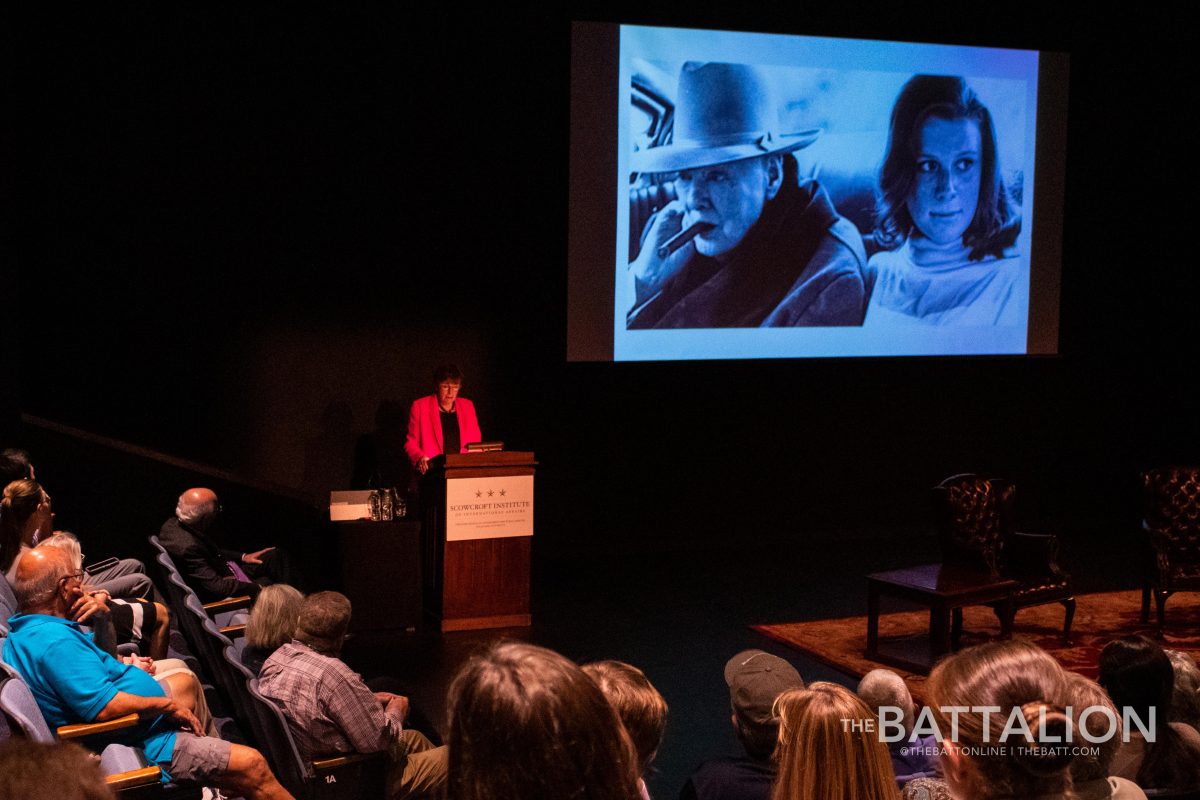Celia Sandys, distinguished speaker and writer, spoke at Rudder Forum about the Great British Bulldog, whom she simply called grandpapa.
On October 24, Celia Sandys discussed the memories of her grandfather, Sir Winston Churchill. Sandys has written five books on her grandfather and is the founder of Churchill Leadership, an organization that focuses on leadership development. She has spoken all over the world on her grandfather’s legacy and has visited Texas A&M before, but returned to share her grandfather’s story.
Sandys shared her personal perspective on her grandfather and reflected upon the time they spent together in England and abroad. According to Sandys, their time together was an important part of her childhood.
“For me, it was all lovely,” Sandys said about the trips she would take to the South of France with her grandfather. “But the very best thing was that just for a few days I would have to myself the grandfather the whole world called their own.”
Sandys shared fond stories of her jovial grandfather which created an image of her grandfather that Sandys hoped to share and explore particularly due to the joy he brought to her life. Sandys said that for the 21 years that Churchill was in her life, he played a major part as she grew up with the most famous man in the world.
“If I had to describe my grandfather, he would be a loving and much loved man, huffing a large cigar with everyone, secretaries, colleagues, family and friends,” Sandys said. “A man with endless knowledge and a million traits who recited poetry, made people laugh, loved animals, and loved walking around his garden at Chartwell, his house in Kent, and above all really loved painting.”
According to Sandys, Churchill’s role in India, Cuba, South Africa, World War I and World War II all took a toll and made him into the leader he was. But everywhere they went together, Churchill always carried his painting tools for a specific reason, Sandys said.
“He started painting at the age of forty when he was very depressed after the Disaster of the Dardanelles in World War I,” Sandys said. “And he picked up one of his children’s paint boxes and decided to play around with it and was hooked. … By the time he died, he painted almost five hundred pictures.”
But the joy that Churchill brought to his family through jokes and stories are what made him grandpapa to Sandys. Sandys said he was fond of a jest and shared some of his most memorable moments in Parliament and from the comfort of their family home.
Yet what truly defines Churchill for the ages, as Sandys recognizes, is his leadership. His unwavering strength is what preserved him during his “wilderness years,” Sandys said or the years when he was out of office and warning England about Germany in the 1930s.
“People said World War I was the war to end all wars but he knew differently,” Sandys said. “He had people coming from Europe and from Germany to tell him exactly what was going on and he had people coming from the government ministries in London to tell him about ill prepared we were. He was very prepared but no one was prepared to listen to him.”
Sandys recalled her awe at the public’s reaction to Churchill’s death. At his funeral, the children and grandchildren did not have to bow to the queen as she was already seated, a special exemption royal manners for Churchill, her most humble servant.
“People came from far and wide to file across the catacomb of Westminster Hall. It was a freezing cold day and they were all beautifully dressed in their best clothes, peuing for hours and hours along the back and across the bridges to file across the catacomb of Westminster Hall,” Sandys said. “Then they lined the streets for the state funeral five days later.”
The impact of Winston Churchill and Sandys’ important remarks was seen across the faces of students present for the lecture. Zan Weng, a political science sophomore, said he felt as though the event was of great importance and that people should remember Churchill for years to come.
“Winston Churchill was actually a very funny guy and so many amazing jokes in his life,” Weng said. “I thought he was just kind of a stone faced figure, but actually he was a very colorful, real human being.”
Weng admired Churchill’s leadership capabilities but also appreciated learning about the more personal stories Sandys shared. But Weng said that he was surprised that not many people were in attendance.
“He was a great leader who did great things and if you want to emulate that you should probably listen and learn about it.”
Celia Sandys speaks on the impact of her grandfather, Sir Winston Churchill
October 25, 2019
Photo by Photo by Kaylee Cogbill
Sir Winston Churchill’s granddaughter, Celia Sandys, speaks at The Scowcroft Institute of International Affairs.
0
Donate to The Battalion
$2790
$5000
Contributed
Our Goal
Your donation will support the student journalists of Texas A&M University - College Station. Your contribution will allow us to purchase equipment and cover our annual website hosting costs, in addition to paying freelance staffers for their work, travel costs for coverage and more!
More to Discover










